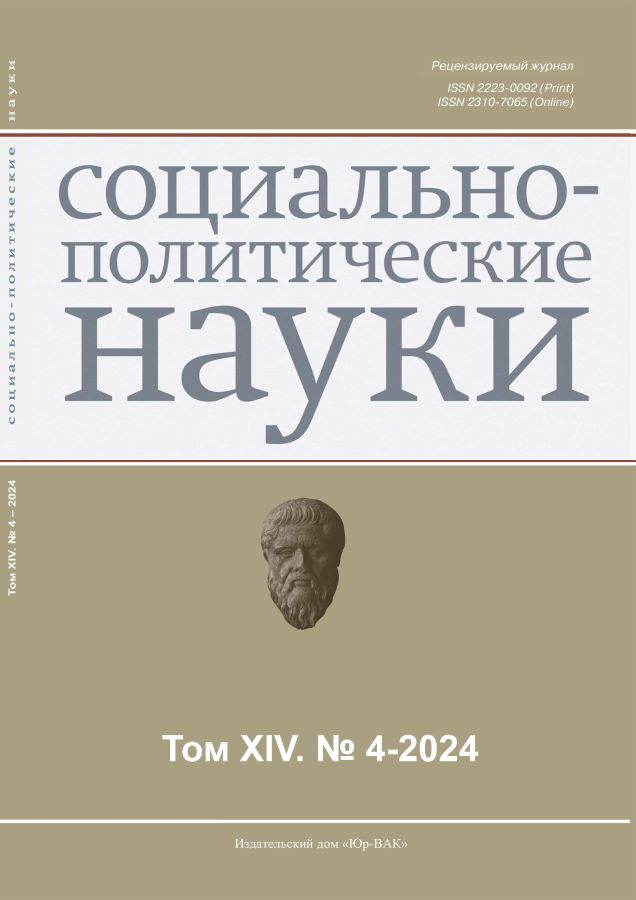Russia and China in the international digital domain
- Authors: Liu J.1, Pavlov D.V.1
-
Affiliations:
- Kazan (Volga Region) Federal University
- Issue: Vol 14, No 4 (2024)
- Pages: 138-144
- Section: National Security of Russia
- URL: https://journals.eco-vector.com/2223-0092/article/view/651369
- DOI: https://doi.org/10.33693/2223-0092-2024-14-4-138-144
- EDN: https://elibrary.ru/PULJTX
- ID: 651369
Cite item
Abstract
The purpose of the research. The article discusses interaction of Russia and China in the digital space and its impact on international relations. The purpose of the study is to analyze the strategies of Russian Federation and China in the digital technologies sphere, including cybersecurity, data protection and digital sovereignty. It is important to predict trends and potential changes in the international digital space, taking into account the growing influence of Russia and China, as well as their possible strategies in the world scene. Results. As a result of the research, the authors come to the conclusion that in the context of an increasingly multipolarity, Russia and China are seeking to expand their influence in the international digital space, which implies the use of various strategies aimed at strengthening their role in the global technology ecosystem. The authors conclude that cooperation between Russia and China in the digital sphere is becoming increasingly close, which can become a significant factor in changing the balance of power in global politics. Both states, using their unique governance models and approaches to digital technologies, have the opportunity to influence the formation of international norms and rules in this area. The study findings highlight the importance of public policy in identifying key challenges and risks associated with digital cooperation between Russia and China, including cyberattacks, data leaks and privacy issues.
Full Text
About the authors
Jia Liu
Kazan (Volga Region) Federal University
Author for correspondence.
Email: wwitty@yandex.ru
postgraduate student, Department of Political Science
Russian Federation, KazanDenis V. Pavlov
Kazan (Volga Region) Federal University
Email: DenisVaPavlov@kpfu.ru
ORCID iD: 0009-0007-2232-5737
SPIN-code: 1099-5125
ResearcherId: HTS-6250-2023
Cand. Sci. (Polit.); teacher, Department of Practice and Theory of Translation
Russian Federation, KazanReferences
- Drozdova M.A. The experience of creating a Chinese digital platform LOGINK as an example of successful practice in the formation of a single digital logistics space for cross-border cooperation. Pacific Rim: Economics, Politics, Law. 2023. No. 2. Pp. 27–38. (In Rus.)
- Ignatov A.A. The BRICS agenda on the internet governance. International Organisations Research Journal. 2022. Vol. 17. No. 2. Pp. 86–109. (In Rus.)
- Larionova M.V. Problems of digital platforms regulation: Challenges and perspectives of international cooperation. International Organisations Research Journal. 2024. Vol. 19. No. 2. Pp. 1–31. (In Rus.)
- Mihajlova A.A. Russia and China in the international digital domain. Vestnik of Immanuel Kant Baltic Federal University. Series: Natural and Medical Sciences. 2023. No. 2. Pp. 31–45. (In Rus.)
- Ostanin V.A., Pecherica V.F., Boyarkina A.V. Russian-Chinese economic cooperation in the concept of global digitalization. Transbaikal State University Journal. 2022. Vol. 28. No. 4. Pp. 126–134. (In Rus.)
- Chzhan V., Pankratova L.S. Transformation of public communication of government and citizens in China and Russia in the context of digitalization. Science Journal of Volgograd State University. History. Area Studies. International Relations. 2023. Vol. 28. No. Pp. 151–164. (In Rus.)
- Shelepov A.V. The influence of the G20’s digitalization leadership on development conditions and governance of the digital economy. International Organizations Research Journal. 2022. Vol. 17. No. 1. Pp. 96–113. (In Rus.)
- Shkvarya L.V., Frolova E.D. Comparative analysis of foreign trade development in the digital segment by world regions. Economy of Regions. 2022. No. 2. Pp. 479–493. (In Rus.)
- Blank S. The Un-Holy Russo-Chinese alliance. Defense & Security Analysis. 2020. No. 36 (3). Pp. 249–274.
- Grzegorzewski M., Christopher M. Incorporating the cyberspace domain: How Russia and China exploit asymmetric advantages in great power competition. The Modern War Institute at West Point. March 15, 2021. URL: https://mwi.usma.edu/incorporating-the-cyberspace-domain-how-russia-and-chinaexploit-asymmetric-advantages-in-great-power-competition/
- Howells L.H.С. Digital authoritarianism in China and Russia: A comparative study. Honors Projects, 2020. 166 p.
- Korolev A. China–Russia strategic alignment in international politics. Amsterdam: Amsterdam University Press B.V., 2022. 200 p.
- Lei Y., Sui S. China–Russia military cooperation in the context of Sino-Russian strategic partnership. Asia Europe Journal. 2020. No. 18 (3). Pp. 325–345.
- Lukin A., Novikov D. Sino-Russian rapprochement and Greater Eurasia: From geopolitical pole to international society? Journal of Eurasian Studies. 2021. No. 12 (1). Pp. 28–45.
- Yoder B.K. The United States and contemporary China–Russia relations: Theoretical insights and implications. Palgrave Macmillan, 2023. 324 p.
Supplementary files









